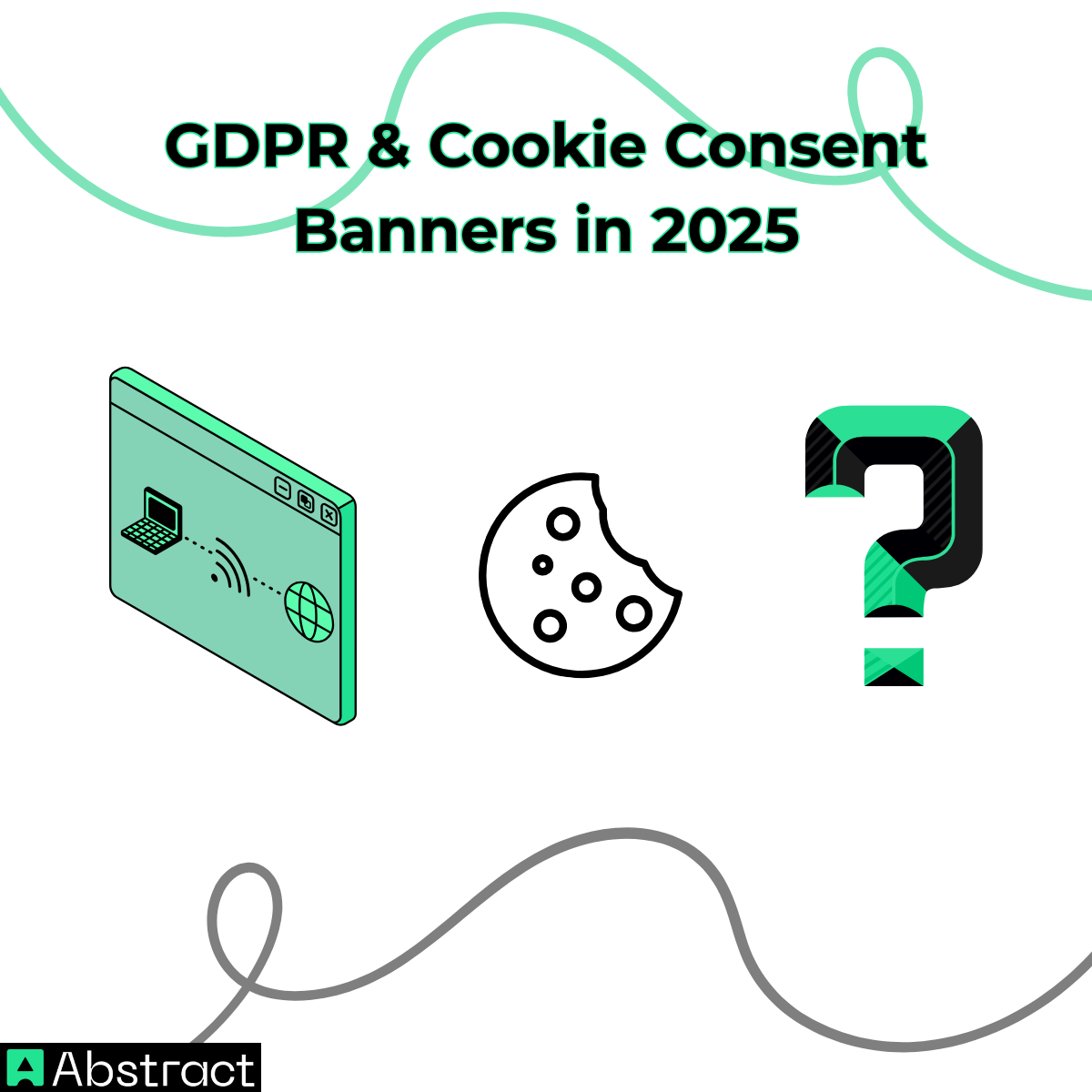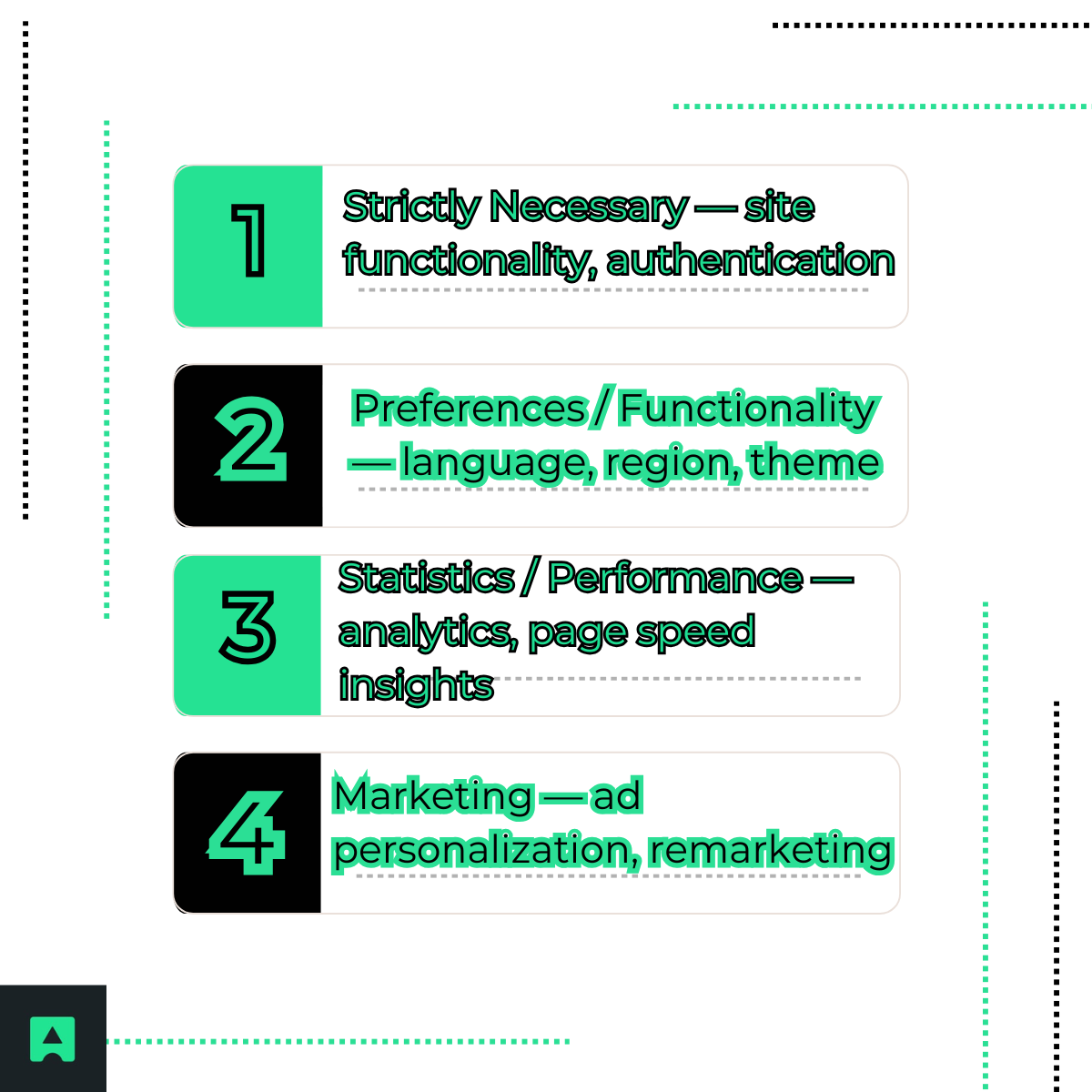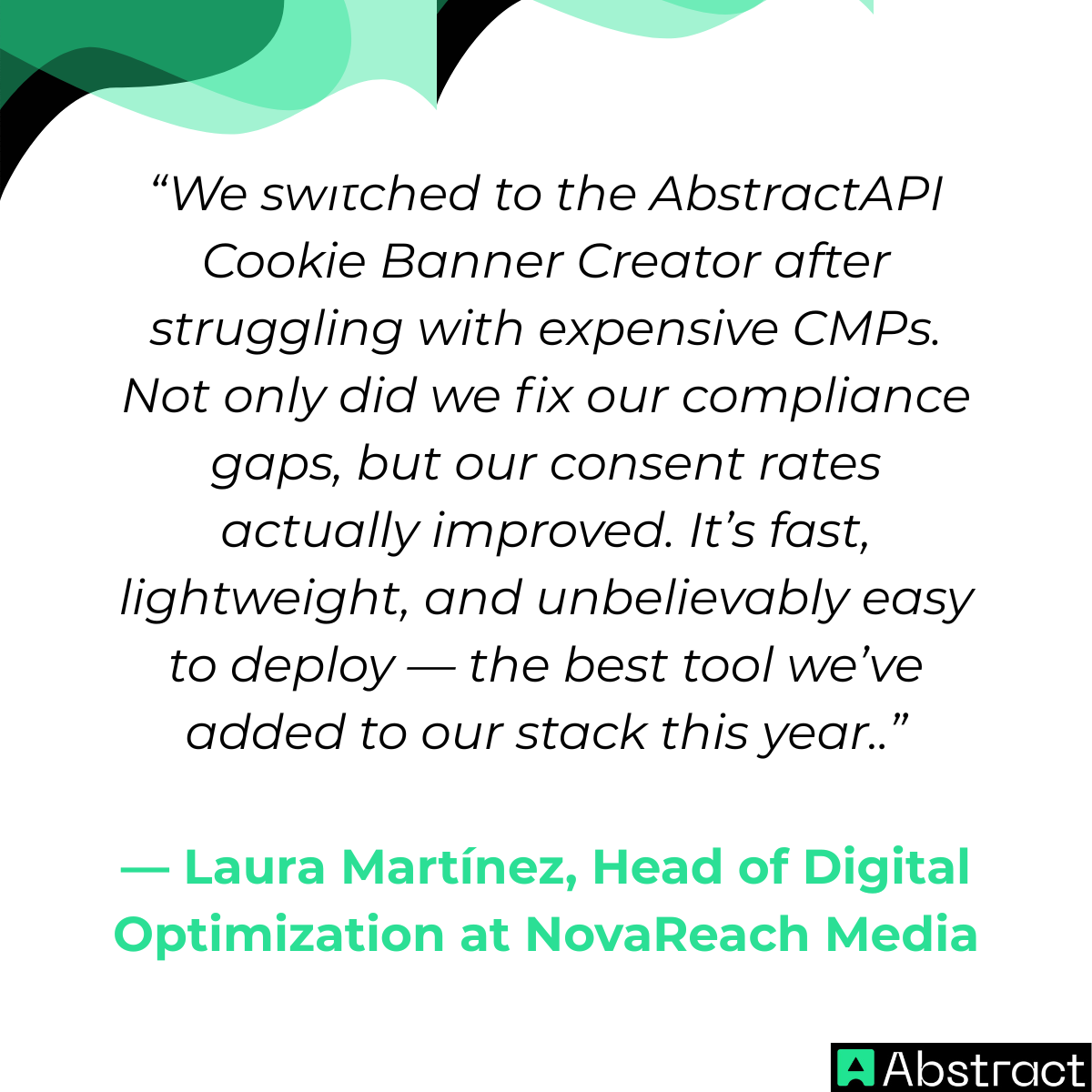GDPR & Cookie Consent Banners in 2025
Last Updated December 15, 2025
Why Modern Cookie Banners Are Now a Marketing Weapon — Not a Legal Headache

Cookie banners used to be boring. A box you clicked just to get it out of the way.
But in 2025, everything has changed. What was once a simple compliance task is now a core pillar of your growth, analytics, and first-party data strategy. And the shift is happening fast.
This guide breaks down exactly why cookie consent is now mission-critical — and how to set up a fully compliant, Google-ready banner using the free AbstractAPI GDPR Cookie Banner Creator.
Let’s dive in 🚀
Why This Matters Now: The Google Consent Mode v2 Mandate
Google has quietly created the biggest change to digital marketing since GA4 — and most businesses still don’t realize how urgent it is.
❗ The New Reality
If your site receives traffic from the UK or EU and you use:
- Google Ads
- GA4
- Floodlight
- Remarketing
- Any Google ad-tech
…then you must enable Google Consent Mode v2 (GCM v2) with a Google-certified CMP.
💥 What Happens If You Ignore It
Not legal fines.
Not warnings.
Your Marketing Breaks.
- 🔇 Remarketing audiences stop updating
- 📉 Conversion tracking fails
- 🕳️ Attribution holes appear everywhere
- 💸 Your ad spend becomes impossible to optimize
In short: Google stops collecting behavioral data until you implement a compliant consent banner.
Why Else This Matters: The Legal Battlefield of 2025
While Google is the “urgent” risk, the legal risk is the expensive one. GDPR enforcement has reached historic levels, with penalties now totaling billions of dollars across the EU.
So…what does actual compliance look like today?
The 2025 GDPR Cookie Banner Compliance Checklist
A banner is compliant only if it includes all of the following:
✔️ 1. Equal “Reject All” and “Accept All” Buttons
Same size, same visibility — anything else is considered manipulative.
✔️ 2. No Dark Patterns
Examples of illegal deceptive design include:
- Pre-ticked consent boxes
- Hiding the “Reject All” option behind extra clicks
- Using misleading colors
- Nudging users toward “Accept” via UI tricks
✔️ 3. Prior Consent (Auto-Blocking)
Analytics, ad pixels, remarketing tags, and trackers must NOT fire before consent.
✔️ 4. Granular Consent Options
Users need control over categories like:
- Strictly Necessary
- Analytics
- Preferences
- Marketing
✔️ 5. Consent Records / Audit Log
Regulators expect proof that each user’s consent was captured and stored securely.
The Big Opportunity: Your First-Party Data Strategy
Here’s the strategic unlock that most businesses miss.
💔 Third-Party Tracking Is Dying
Between the Chrome cookie phase-out, Apple privacy rules, and the GDPR crackdown, third-party tracking is collapsing.
💡 The Only Sustainable Data Source Left:
Consent-based first-party data.
A transparent, trustworthy cookie experience increases:
- User trust
- Opt-in rates
- First-party audience size
- Data quality for AI and automation
- Long-term marketing accuracy
The banner becomes your first touchpoint for building a permission-based relationship.
And trust drives conversions ❤️
The Solution: The AbstractAPI Free GDPR Cookie Banner Creator
Now the exciting part 😎
Most cookie tools fall into one of two buckets:
❌ 1. Heavy, Expensive Suites
Tools like CookieYes, Termly, or Enzuzo:
- Costly subscriptions
- Slow site performance
- Bloated dashboards
❌ 2. Free Tools That Are… Not Compliant
Some free banners skip critical requirements like:
- Audit logs
- Auto-blocking
- Proper Consent Mode v2
- Granular categories
This creates massive exposure for the site owner.
✅ AbstractAPI: Free, Lightweight, Developer-Friendly
The AbstractAPI Free GDPR Cookie Banner Creator gives you:
- Full Google Consent Mode v2 support
- Built-in auto-blocking
- Audit-ready consent logs
- Granular categories
- Modern, clean UI
- 100% free
- No bloated scripts
- Easy integration for developers
In other words: Enterprise-grade compliance without the enterprise-grade price tag.
How to Install a Cookie Banner (WordPress, Squarespace, GTM)
This part targets users searching for implementation help — extremely valuable for SEO.
How to Add the Banner to WordPress
You have two options:
⭐ Option A — The Simple Way (WPCode or Code Snippets Plugin)
- Install WPCode
- Paste the banner JS snippet from the AbstractAPI Builder
- Select Header injection
- Save and activate
⭐ Option B — Manual Method via functions.php
- Create or edit your child theme
- Add a function to enqueue the script
- Paste the embed code
- Clear any caching plugins
How to Add the Banner to Squarespace
Available on Business plans and above.
- Go to Settings → Advanced → Code Injection
- Paste the JavaScript snippet into the Header section
- Save changes
- Clear site cache
How to Add the Banner Using Google Tag Manager
This is the advanced (and Google-recommended) setup.
- Open GTM
- Create a Consent Initialization trigger
- Add a new tag containing the AbstractAPI JavaScript snippet
- Publish your workspace
- Test using Google Tag Assistant
Foundational Knowledge: Cookies, Types & FAQs
To build topical authority, we need to cover the basics.
What Are Cookies?
Cookies are small data files stored in the user’s browser. They power everything from login sessions to analytics and ad personalization.
The 4 Categories of Cookies

FAQ: Quick Answers to Common Questions
💭 Is a Cookie Banner the Same as a Cookie Notice?
- No. A notice informs the user. A banner provides choice. GDPR requires choice.
💭 Will a Cookie Banner Hurt SEO?
- No — in fact, a fast, compliant banner improves trust signals and protects analytics accuracy.
💭 Do I Need a Cookie Banner Outside Europe?
- If you have any visitors from the EU or UK, yes — especially because of Google’s Consent Mode v2 requirements.
💭 Can I A/B Test My Banner?
- Yes. Consent rate optimization is becoming a core part of first-party data strategy.
Final Thoughts: Compliance Is Now Growth
The cookie banner is no longer “just compliance.”
It’s:
- Your first contact with the user
- Your gateway to trust
- Your best method of collecting first-party data
- Your key to keeping Google Ads & Analytics alive
- A foundation for a cookieless future
And with the AbstractAPI Cookie Banner Creator, you can launch a fully compliant, Google-ready banner in minutes — without paying a cent.

Ready to protect your site and unlock stronger data?
Let’s build your banner today 🚀

